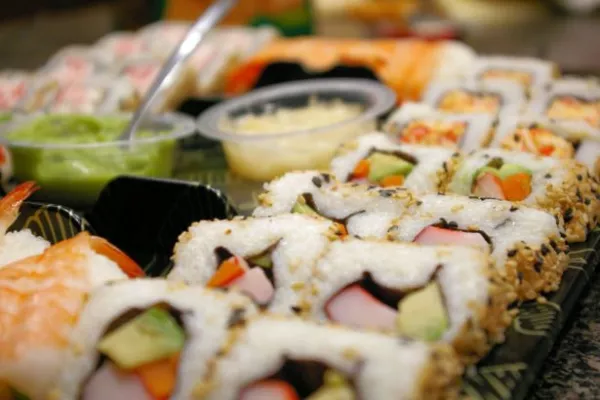The combination of the words “airport” and “sushi” do not normally inspire confidence in a high-quality gastronomic experience.
But just in time for peak holiday travel season, Newark Liberty International Airport (EWR) has introduced Tsukiji Fishroom, a grab-and-go spot featuring products from the world-renowned seafood market in Tokyo.
OTG Management Inc., a restaurant group spearheading the ongoing $120 million renovation of United’s Terminal C, is sourcing directly from Japan’s seafood mecca for its new concept.
The quality of the fish at Tsukiji is widely recognized: The line outside Daiwa sushi restaurant just outside the market starts at 4 a.m., and the wait can span hours. At Newark, customers will have to endure only the TSA checkpoint line. (To be fair, that wait can be long, too, unless you pay to cut it.)
OTG acquires the fish through a partnership with True World Foods LLC, which buys at Tsukiji market for over 10,000 restaurants in Japan and for such high-end American clients as Nobu, Brooklyn Fare, Blue Ribbon, and Sushiden. The partnership is the first time True World has worked with an American airport restaurant.
“What we’re creating in United’s terminal is sushi in an airport, not airport sushi,” says Eric Brinker, OTG’s vice president of experience.
The tuna auctions at Tsukiji market start each day at 5:30 a.m. Hundreds of vendors and registered agents inspect each fish for fat content and then place bids, usually ranging from 2,700-10,800 yen ($24-$96) per kilogram, or about $11-$44 per pound. The highest price ever paid for a single tuna at Tsukiji market is $1.8 million, in 2013.
By 8 a.m., the fish are on their way to True World’s processing facility, where they are cut into slightly more manageably sized pieces and packed for a 12-hour flight that evening. When the plane lands at Newark at 4:30 p.m. East Coast time, the fish is brought to Tsukiji Fishroom and butchered for serving—a mere 25 hours after it was purchased at auction halfway around the globe.
In addition to tuna, the restaurant group currently buys hamachi (yellowtail), saba (mackerel), amadai (tilefish), tako (octopus), and hotate (scallop) from Tsukiji market.
“Everything we carry is based on what’s good and what’s in season,” says Nate Appleman, OTG’s vice president of culinary.
Not all the fish comes from Tokyo. Salmon isn’t served at traditional sushi restaurants in Japan, and it doesn’t have much of a presence at the market, either. But its popularity in the United States has induced OTG to import Norwegian salmon.
The grab-and-go boxes at Tsukiji Fishroom can be mixed and matched and come in three sizes, starting at $9.99. The same sushi can also be purchased at sit-down restaurants Surf and Caps Beer Garden, also located in Terminal C.
If you’re not a frequent international traveler, this may constitute one of your last chances to eat fish from the current Tsukiji: The historic market is scheduled to move in 2018 to much-newer facilities.
News by Bloomberg, edited by Hospitality Ireland









